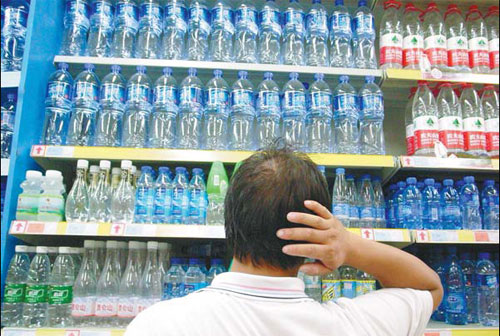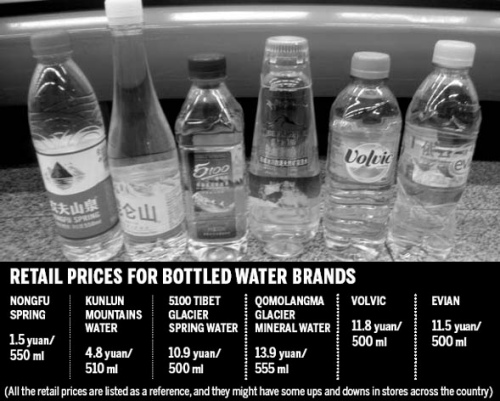

On July 6, after a month-long silence, Evian held a news conference in Shanghai to address the issue of the excessive nitrite found in its products.
Dai Ning, general manager of Danone Premium Brands, which owns the Evian brand, said his company could not confirm that the water that failed an inspection was produced by Evian.
Excessive nitrite intake can cause oxygen depletion and even cancer if ingested over a long period of time.
"It's hard to confirm if the affected products were real Evian water, or where they came from, because they were not imported by an assigned official importer to the Chinese market," Dai said.
Untapped ocean
This was the sixth time in the last six years that the company was inspected due to quality problems. Experts said that even if the tainted water was indeed not produced by Evian, the incident exposed the company's weak control over its import chain and its vulnerability to negative news.
For most domestic water companies, the Evian incident offered a rare opportunity to catch up.
A number of Chinese companies are quietly setting foot on the high-end water market, long dominated by overseas brands like Evian, Volvic and Perrier. A few domestic brands - such as 5100 Tibet Glacier Spring Water - have already exceeded the sales of those foreign giants.
In its latest financial report, Tibet 5100 Water Resources Holdings Ltd, which produces the water, said its revenues in 2011 were 633 million yuan ($99.2 million), up 76 percent from the previous year.
The figure is impressive, given that the company's first production line was set up only five years ago. In that time, the company went public in the Hong Kong Stock Exchange, becoming the first domestic premium mineral water maker to launch an IPO.
For other water companies, the high profit margins are more appealing. In the financial report, Tibet 5100 said its gross profit margin was 79 percent, up from 64 percent a year before.
A report by Euromonitor said the profit margin of high-end bottled mineral water is six to seven times that of the bottled water for the general market.
For many Chinese water companies, long disappointed with the industry's meager margins, the lucrative high-end market is an untapped ocean.
According to CIConsulting, an industry research institution, the market value of high-end bottled water in 2011 was 3 billion yuan and the figure is projected to grow to 10 billion yuan by 2015.
But given the size of China's market, the figure is a drop in the ocean. Chinese people on average drink 18 liters of bottled water a year, compared with 117.5 liters in Europe.
Liao Lei, secretary-general of the China Mineral Water Committee of the China Mining Association, said that Tibet 5100 is one of the few brands making a profit. Of the 100-odd major domestic mineral water producers, most are suffering losses or only making meager profits.
According to Liao and other industry experts interviewed by China Daily, low recognition, among other factors, are hindering the companies' chances of transferring the huge potential into tangible profits.
Even though the public isn't aware of it, the natural mineral water business involves little processing.
"We just do some basic filtering. But even the filtering is a preventative measure because there are virtually no impurities in the water," said Pang Zhenguo, general manager of quality assurance at the JDB Group, which produces Kunlun Mountains water.
Daunting task
Compared with manufacturing, finding an appropriate water source and then placing the product in stores' shelves is a much more daunting task.
Pang said it took him 10 years to spot a place on the Kunlun Mountains in West China and build a factory there.
The time span, which initially seems exaggerated, becomes more plausible after Pang explains his criteria.
The water quality is the top concern, and mineral water from Kunlun Mountains meets that criteria. But according to the China Mineral Water Committee, there are 4,400 spots capable of producing mineral water across China.
Other factors must be crossed out also, which makes the process so time consuming.
Pang said that low population density, easiness to conserve water quality, and water quantity are all critically important for the selection of the water source. In order to find the right source, he said he had to scour "every corner" of Tibet, a region believed to have some of the few uncontaminated water sources in China.
But several places in Tibet - which has also the best water quality - either didn't have enough water or it wasn't easy to conserve the water quality. So they had to be dropped from the list.
"One spot in Tibet had good water quality, but it wasn't far from a highway. The road made it difficult to set up a large conservation area to prevent contamination," said Pang.
The current site for Kunlun Mountains water is protected by JDB with a conservation area of 11 square kilometers.
Pang said that an area on the Changbai Mountains in Northeast China was considered, but the fact that too many domestic companies use the mountains for their branding made him drop it.
"The water source is the most valuable asset for a mineral water brand. If another company which uses the same asset does something wrong, it will be an irreversible damage to my brand," Pang said.
Exploration was further delayed by the release of a new national standard for mineral water in 2008. The standard imposed stricter upper limits for several substances. The standard for bromate, a potential carcinogen, for example, was lowered to below 0.01 milligram a liter.
In 2007, Pang finally found the right place - Xidatan on the Kunlun Mountains, a site on the Tibetan Plateau that is 4,100 meters above sea level.
The site, according to Pang, provides sufficient and high-quality mineral water, is backed by a runoff made of melting snow, and has a low population density, making it easier to conserve water quality.
But that wasn't enough. To test if the water quality was stable enough, Pang sampled the water every month for six months, and sent the samples to three independent laboratories. The results finally persuaded him to build his factory there.
The efforts by Pang and his team have paid off.
In February, Kunlun Mountains Natural Mineral Water won the Watermaster's Golden Award of Excellence at the annual Berkeley Springs International Water Tasting, an event dubbed the water industry's Oscars.
Tian Wei, JDB Group's brand manager, said the reward was a proud moment for her and for the company.
"It's the first time that a Chinese brand, or even an Asian brand gets this honor," Tian said.
She said that JDB was invited by Arthur von Wiesenberger, president of the event, after he tasted the water in China. He even flew to Xidatan to check the site.
"He tasted the water on the mountains and found the taste to be almost the same as the bottled water," Tian said.

Copyright ©1999-2011 Chinanews.com. All rights reserved.
Reproduction in whole or in part without permission is prohibited.